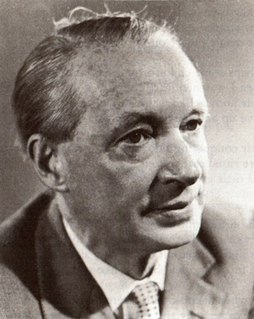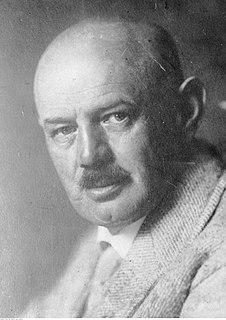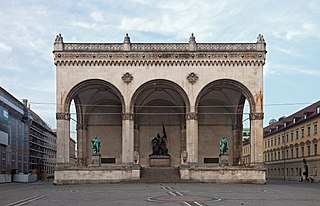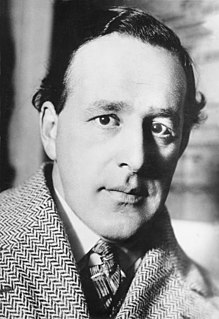
Edwin Muir was a Scottish poet, novelist and translator. Born on a farm in Deerness, a parish of Orkney, Scotland, he is remembered for his deeply felt and vivid poetry written in plain language and with few stylistic preoccupations. His wife, Willa Muir, translated the works of many German authors, including Franz Kafka. These were issued under their joint names, but his wife notes that he "only helped".

Johann Ludwig "Lutz" Graf Schwerin von Krosigk was a German senior government official who served as Minister of Finance of Germany from 1932 to 1945 and de facto Chancellor of Germany in May 1945.

Dietrich Eckart was a German journalist, playwright, poet, and politician who was one of the founders of the German Workers' Party, the predecessor to the Nazi Party (NSDAP). Eckart was a key influence of Adolf Hitler in the early Nazi Party, the original publisher of the party newspaper, the Völkischer Beobachter, and the lyricist of the party anthem, Deutschland erwache. Eckart was a participant in the Beer Hall Putsch in 1923 and died shortly after his release from Landsberg Prison. Eckart was elevated to the status of a major thinker and writer upon the establishment of Nazi Germany in 1933, and has been called the spiritual father of National Socialism.

Lion Feuchtwanger was a German-Jewish novelist and playwright. A prominent figure in the literary world of Weimar Germany, he influenced contemporaries including playwright Bertolt Brecht.

The Feldherrnhalle is a monumental loggia on the Odeonsplatz in Munich, Germany. Modelled after the Loggia dei Lanzi in Florence, it was commissioned in 1841 by King Ludwig I of Bavaria to honour the tradition of Bavarian Army.

Ernst Franz Sedgwick Hanfstaengl was a German-American businessman and intimate friend of Adolf Hitler. He eventually fell out of favour with Hitler, however, and defected from Nazi Germany to the United States. He later worked for Franklin D. Roosevelt and was once engaged to the author Djuna Barnes.

Emil Ludwig was a German-Swiss author, known for his biographies and study of historical "greats."

Dietrich Richard Alfred von Hildebrand was a German Roman Catholic philosopher and theologian.
Feuchtwanger is a German surname, indicating a family origin from the city of Feuchtwangen. Notable people with the surname include:
Paula Hitler was the younger sister of Adolf Hitler and the last child of Alois Hitler Sr. and his third wife, Klara Pölzl.

Prince Ludwig Ferdinand of Bavaria, was a member of the Bavarian Royal House of Wittelsbach and a General of Cavalry. Following his marriage to Infanta María de la Paz of Spain, he also became Spanish infante.

Infanta María de la Paz of Spain was an infanta of Spain. A daughter of Queen Isabella II of Spain, she married her first cousin Prince Ludwig Ferdinand of Bavaria. She lived for the rest of her life in Germany, dedicating her time to her family, charity work and writing poetry. She wrote a book of memoirs: Through Four Revolutions: 1862–1933.

The Life of Edward II of England, also known as Edward II, is an adaptation by the German modernist playwright Bertolt Brecht of the 16th-century historical tragedy by Marlowe, The Troublesome Reign and Lamentable Death of Edward the Second, King of England, with the Tragical Fall of Proud Mortimer (c.1592). The play is set in England between 1307 and 1326. A prefatory note to the play reads:
The Hitler family comprises the relatives and ancestors of Adolf Hitler, an Austrian–born German politician and the leader of the Nazi Party, formally called National Socialist German Workers' Party. He was dictator of Germany, holding the titles Chancellor of Germany from 1933 to 1945, and served as head of state as Führer und Reichskanzler from 1934 to 1945. He is noted for his central role in the rise of nazism in Germany, provoking the start of World War II, and the death of millions of people in the Holocaust.

Jud Süß is a 1940 Nazi German historical drama propaganda film produced by Terra Film at the behest of Joseph Goebbels, and considered one of the most antisemitic films of all time. The film was directed by Veit Harlan, who wrote the screenplay with Eberhard Wolfgang Möller and Ludwig Metzger. The leading roles were played by Ferdinand Marian and Harlan's wife Kristina Söderbaum; Werner Krauss and Heinrich George played key supporting roles.
Manfred George, born Manfred Georg Cohn, later shortened to Manfred Georg, was a German journalist, author and translator. He left Germany after the Nazis came to power, living in several different European countries and eventually emigrating penniless to the United States in 1939. He became the editor of Aufbau, a periodical published in German, and transformed it from a small monthly newsletter into an important weekly newspaper, especially during World War II and the postwar era, when it became an important source of information for Jews trying to establish new lives and for Nazi concentration camp survivors to find each other. George remained Editor in Chief of Aufbau until his death.
German Exilliteratur is the name for a category of books in the German language written by writers of anti-Nazi attitude who fled from Nazi Germany and its occupied territories between 1933 and 1945. These dissident authors, many of whom were of Jewish origin and/or with communist sympathies, fled abroad in 1933 after the Nazi Party came to power in Germany and after Nazi Germany annexed Austria by the Anschluss in 1938, abolished the freedom of press and started to prosecute the authors whose books were banned.
Henry Hay was the pen name of June Barrows Mussey, a journalist and translator who is notable for his writing about magic, sleight of hand and also of a large number of European authors including Lion Feuchtwanger.

Marta Feuchtwanger was the irrepressible and somewhat eccentric third child of a prosperous Munich businessman who in 1912 married the author Lion Feuchtwanger. Although they married only after Marta became pregnant with Feuchtwanger's child, the marriage lasted forty-six years and she became both a devoted wife and a huge influence on his work. The Jewish couple were forced to emigrate during the Hitler period. After her husband died in 1958 Marta Feuchtwanger spent nearly three decades as a high-profile widow in Los Angeles.
Edgar Joseph Feuchtwanger is a German-British historian.












